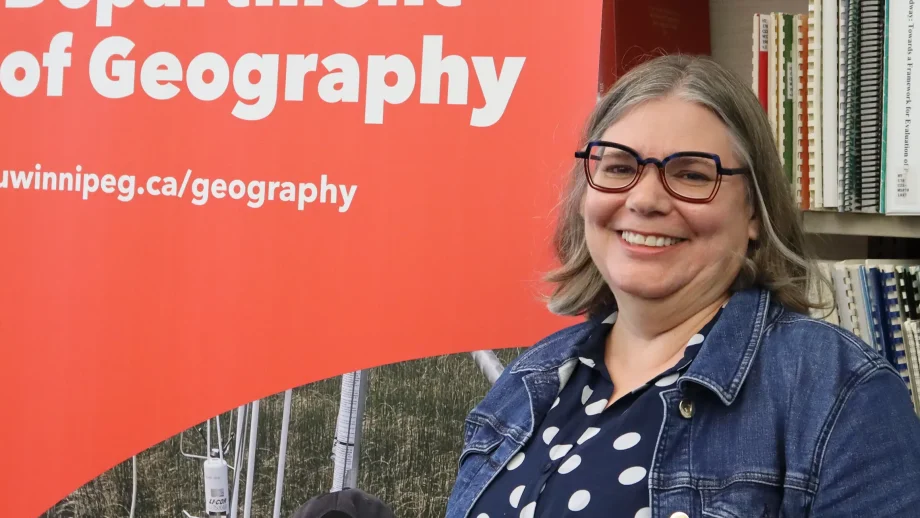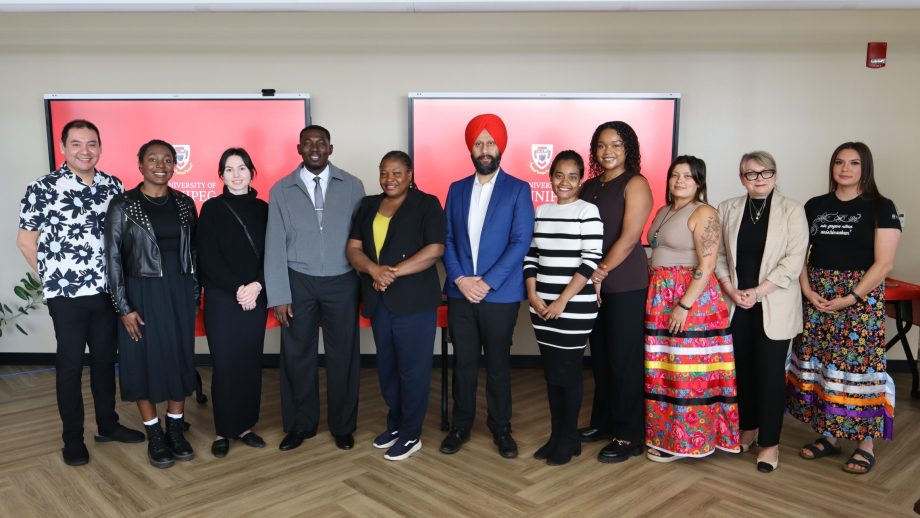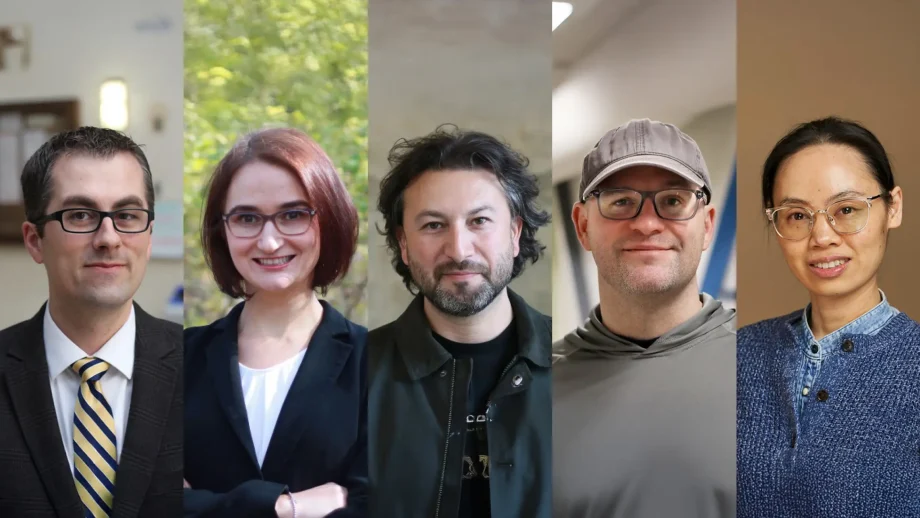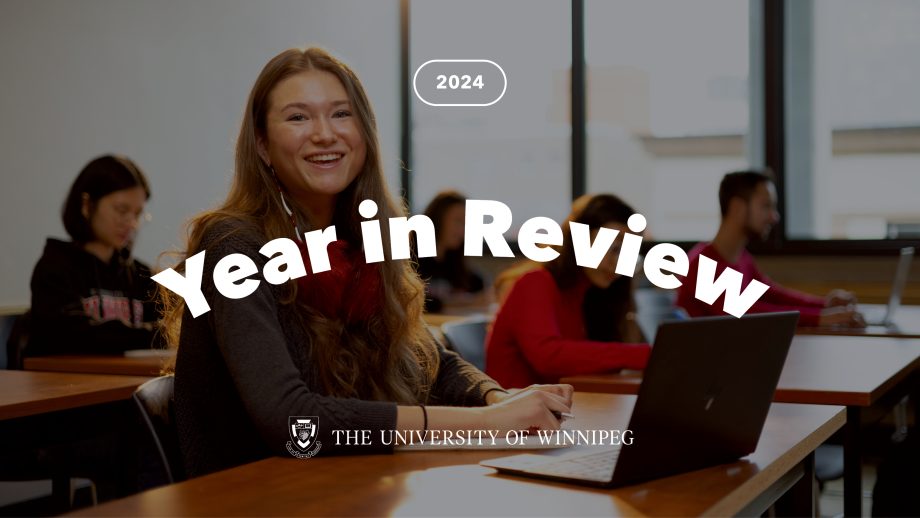Six University of Winnipeg faculty members have each been awarded a Social Sciences and Humanities Research Council (SSHRC) Insight Grant for 2024, totaling more than $750,000 in research funding.
Insight Grants support research proposed by scholars and judged worthy of funding by their peers and/or other experts. These grants support research excellence in the social sciences and humanities, and provide stable support for long-term research initiatives, which is central to advancing knowledge.
Mary Jane McCallum
Professor, Canada Research Chair in Indigenous People, History and Archives, Mary Jane McCallum, received $334,884 for the project, Legacies of Colonial Violence: Munsee Land and History in Southwestern Ontario.
The voices of the Munsee Delaware Nation (MDN) are currently missing in Canada’s national heritage environment.
This project will build a two-year exhibition at the Canadian Museum of History (CMH) that centers family history within the larger history of the MDN.
The project will address the ongoing misrepresentations and exclusions of Indigenous Peoples and history within the heritage sector. It will also provide an enhanced understanding of Munsee history in Canada and the local experience and legacy of colonial violence in southwestern Ontario.
This exhibit will have broad educational benefits, and can help change attitudes, policies, and beliefs about First Nations people and history that that impact Indigenous communities daily, including our experience of heritage sites.
Sharanpal Ruprai
Associate Professor and Chair of Women’s and Gender Studies, Sharanpal Ruprai, received $94,368 for the project, Desi+: Digital Artistic Productions by Queer Sikhs.
Sikh Canadians have made significant contributions to literature, film, and most recently social media; however, many of their contributions are under-examined and are not valued as sites of socio-political change and cultural expression.
To widen collective understanding of Queerness and the impact it has on socio-political change, this research looks at how South Asian artists represent, formulate, and negotiate their identities through artistic productions on social media.
Inspired by the recent rise of websites and social media profiles by Queer South Asian artists who use their cultural and religious backgrounds within their creations, this project will explore how these artists use social media to create new ways of cultural expression.
This research will look at the ways social media impacts belonging and changing culture, and examine how these new ways of cultural expression impact social change.
Celiese Lypka
English Department Assistant Professor, Celiese Lypka, received $74,138 for the project, Living Lost: Writings on Métis Kinship, Loss, & Home.
The specific disavowal of Métis peoples through the colonization of Canada has led to generations of Métis peoples struggling to find and understand themselves. Often, Métis peoples had to rely on family stories or genealogies to challenge the eradication of their lives and authorize their experiences.
The impacts of living with a lost sense of cultural identity for Indigenous adoptees from this era of the Indigenous child welfare system remain under investigated.
This research-creation project will reflect on personal family stories to make cultural and intellectual contributions that interrogate narratives surrounding the Sixties Scoop, Métis identity, and Indigenous adoptee dislocation.
It will investigate the physical and emotional separation of those removed from their communities, and will also complete emotional and spiritual work that contends with what it means to lose kinship connections and reclaim them.
Amy Desroches
Psychology Professor, Amy Desroches (with Co-Applicants, Stephen Smith and Stephanie Bugden), received $94,999 for the project, Reading and math achievement in the early school years.
Reading and math are fundamental skills that are critical for everyday tasks like communicating with a loved one via text, filling out forms at a doctor’s office, arriving to work on time, or managing expenses.
Unfortunately, children who struggle with reading and math are at risk for long term social, emotional, and professional challenges. Current methods for identifying children at risk for reading and math failure are not sufficient.
This project will examine the unique and shared factors that predict reading and math achievement, investigate the influences of emotion identification and emotion regulation on reading and math development, and use brain imaging to gain more insight into how early phonological and numerical processing capacities relate to reading and math development.
Peter Miller
Associate Professor and Classics Chair, Peter Miller, received $69,337 for the project, Classical Antiquity and Physical Culture.
Physical fitness is now a mainstay of most people’s lives and central to social and educational institutions, yet contemporary physical fitness has its roots in the 19th century with ancient Greek and Roman practices.
Fitness classes, like “Spartan boot camps”, are straight-forward examples, but the legacy of Greece and Rome have had a lasting effect on physical culture. These practices have affected how people have endeavored to enhance their bodies, and also the meaning of different types of bodies socially, culturally, medically, and athletically.
In contrast to related topics like ancient and modern sport, the influence of the Classical World on modern physical culture has received virtually no scholarly attention. This project addresses this gap and will provide insight on the influence of Classical Antiquity on contemporary physical fitness and physical culture.
Lam An
Business and Administration Assistant Professor, Lam An (with Co-Applicant, Fabrizio Di Muro), received $89,382 for the project, The Face of Disinformation: How Facial Expressions Impact Persuasiveness of Fake News.
Disinformation has become a serious issue in Canadian society, causing significant harm to consumers and society.
Human faces are widely featured in news articles, media, and marketing communications to engage audiences and to influence beliefs and attitudes. Yet, little research examining disinformation has focused on the human faces and how they may influence subsequent consumer decisions.
Leveraging recent research that emphasized the importance of facial perceptions in information processing, this project will study how facial expressions in fake news articles influence the article’s persuasiveness, and how facial expressions could impact a consumer’s processing of disinformation. It will also look at ways to neutralize the effectiveness of disinformation.





